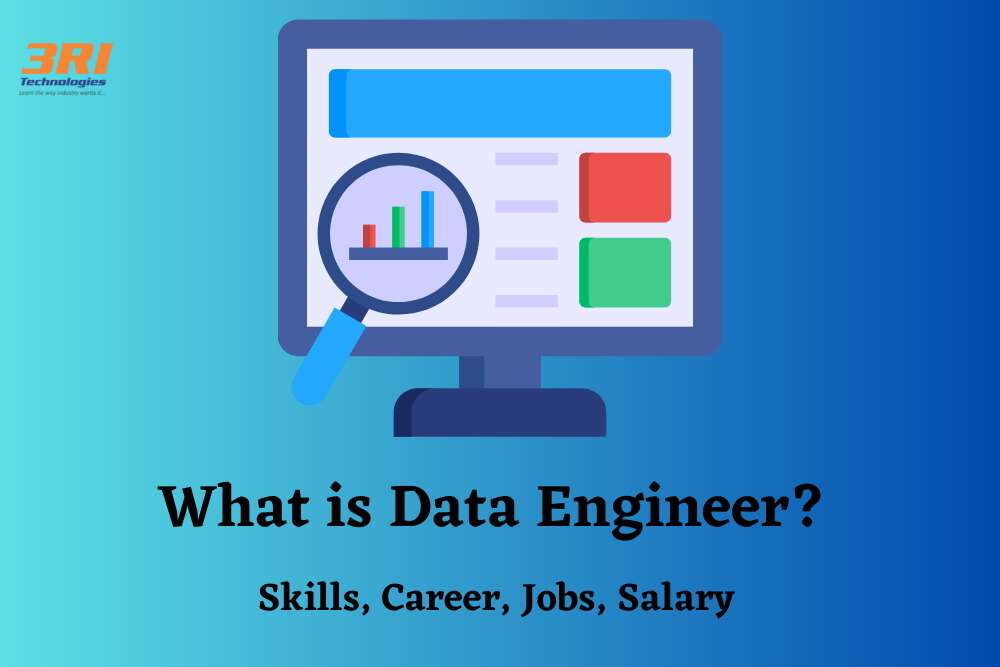If you want to know what is a data engineer then he/she is an Information Technology professional who primarily aims to prepare data for operational and analytical use. They are responsible for building, designing, and optimizing data pipelines for the collection, management, and transformation of data.
In the age of big data, the role of a data engineer has become one of the most vital in the tech industry. Understanding the daily data engineer work is the first step to seeing if this career is for you, but the real question is: what are the data engineer qualifications and the specific data engineer skills required? The list of data engineering skills is extensive, often overlapping with database engineer skills but focusing more on building large-scale data pipelines. This article will explore every crucial data engineer skill and the other data engineer required skills you’ll need. For those serious about building a successful career, the Best Data Engineer course provides the structured, hands-on training necessary to master these competencies and land a top job.
Wondering what does data engineer do? A data engineer handles the core aspects of data in software engineering and data science. They use the principles of software engineering in developing algorithms to automate the processes. They work in collaboration with data scientists to build infrastructure for Analytics and machine learning right from the testing phase to deployment. They also help the companies structure as they can access the data easily whenever needed and the teams can deliver better insights derived from the provided data.

The Essential Data Engineer Skills You Need to Master
If you are wondering who is a data engineer then a data engineer works as a part of an analytics team with data scientists. They provide data to data scientists in a usable format so that information is extracted easily for predictive analytics. A data engineer is responsible for designing, developing, and managing the infrastructure and systems that are required to handle large amounts of data in an organization.
They focus mainly on the data pipeline to ensure a smooth flow of data from different sources to store data and process systems. They play a crucial role in enabling decision-making driven by data and they also make sure that the quality of data is reliable and accessible. They team up with analysts and data scientists to understand their data requirements and develop great solutions.
One of the main responsibilities of a data engineer is to implement and design data processing architectures. They work with technologies like Apache Spark, Apache Hadoop, and other cloud-based data platforms to extract data from various sources and transform it into data warehouses. They are proficient in programming languages like SQL, Java, and Python and are experts in database systems like MySQL, PostgreSQL, and NoSQL databases.
What is the role of a Data Engineer?
There are several data engineer roles and responsibilities that are performed by data engineers:
- Work on data architecture: Data engineers utilize a methodical approach to plan, create and maintain data architectures and they also keep it aligned with the requirements of businesses.
- Gather data: The data engineer obtains data from the right sources before starting any work on the database. They can store optimized data after formulating the dataset process.
- Perform research: A data engineer needs to perform thorough research in the industry to find out any issues that can crop up while addressing a business problem.
- Upgrade skills: Data engineers need to improve their skills consistently and they should have the knowledge and power to work in different development fields. They should be up to date with algorithms and machine learning.
- Identify patterns and create models: Data engineers make use of descriptive data models to gather data for the extraction of insights. They make predictive models to apply the forecast techniques and derive future insights. A data engineer identifies hidden patterns from given data.
Interested to begin a career in Data Analytics? Enroll now for Data Analytics Courses in Pune.
Responsibilities of Data Engineer:
Data engineer roles and responsibilities revolve around the management, designing, and implementation of data infrastructure so that they provide effective data processing, storage, and analysis. Data Engineer responsibilities include
- Data Pipeline development: Data engineers have to build and maintain data pipelines that extract, transform, and load data from different sources in data lakes and warehouses. They optimize and design pipelines to ensure that there is data accuracy, timeliness, and completeness.
- Data modeling and database design: data engineers develop models and design databases that store and organize vast amounts of data that are structured and unstructured. They use techniques like indexing, normalization, and partitioning to augment data retrieval performance.
- Integration of data: they integrate different data sources and systems and ensure seamless data flow. They also develop solutions for data synchronization, integration, and consolidation for a unified data view.
- Data quality and governance: They implement data quality checks and validation processes for better data integrity and accuracy. They establish policies and procedures for data governance to maintain more security, privacy, and compliance of data.
- Management of infrastructure: They manage and optimize data infrastructure like servers, databases, clusters, and cloud platforms. They also monitor system performance, scale infrastructure and troubleshoot issues to handle growing data and processing the demands.
Data Engineer career path/career roles:
Data engineering offers great opportunities and data engineer jobs to professionals who like working with data and technology. The data engineer career path involves playing a vital role in the data analytics field and helping companies make better decisions by managing and processing large amounts of data. The career role includes tasks like data ingestion, data transformation, data integration, and data storage. They work closely with data scientists, analysts, and stakeholders to understand their data requirements and ensure that the infrastructure is optimized for reporting and analysis. Data engineering job requires taking on different roles on the basis of their skills and interests and the common paths include
- Data Pipeline Engineer: In this role a data engineer designs and builds data pipelines to move data effectively from different sources to the data warehouse and data lake. You can work with technologies like Apache Airflow, Apache Kafka, and ETL tools to ensure that there is reliable data ingestion and transformation.
- Big Data Engineer: Data engineer career in this role specializes in handling large-scale data processing and storage while using technologies like Spark, Hadoop, and NoSQL databases. They optimize data processing workflows and make sure that there is better scalability and high performance.
- Cloud data engineer: More and more organizations are adopting cloud technologies so there is growing demand for data engineers with expertise in cloud platforms like AWS, GCP, or Microsoft Azure. They design and implement data solutions on the cloud while leveraging managed services and the approach of infrastructure-as-code.
- Data Architect: In this role, a data engineer designs the entire data architecture and data modeling for companies. They collaborate with data scientists and stakeholders to understand business needs and define data structures to ensure data integrity, security, and scalability.
- Machine Learning Engineer: If you have a strong foundation in data engineering you can take up the role of implementing and deploying machine learning models. Machine learning engineer works on data preprocessing, feature engineering, and model deployment pipelines for insights.
Check out the Data Science online training and get certified today.
Data Engineer Skills:
Data engineers skills play a crucial role in today’s world and ensure that the data is collected, stored, processed, and accessible for Data Analytics. Data engineer skills required are both in technical and domain-specific fields. They should have a strong understanding of programming languages like Java, Python, and Scala. If they are proficient in these languages then they can write efficient codes to extract, transform and load data from different sources.
They should also be efficient in SQL and database technologies and should be able to design and manage data storage systems. Skills of Data engineers must include having knowledge of big data frameworks and tools like Apache Hadoop, Apache Kafka, and Apache Spark. Using these technologies data engineers can process large volumes of data in real-time and enable timely decision-making with the help of insights. They should be proficient in data modeling and schema design.
Data engineers should understand the way of creating data models for the requirement of data analysts and data scientists. With proficiency in data integration techniques and quality assurance, they should be able to provide accuracy and reliability of data pipeline. They should have strong problem-solving and troubleshooting skills and should be able to identify and resolve issues related to data transformation, ingestion, and data pipeline performance.
Salary based on Experience:
Data engineer salary varies on the basis of different factors like experience location industry and the size of the company. In general the salary increases with an increase in experience. Entry-level data engineers with 0-2 years of experience receive an average salary ranging from 4 to 7 lakhs INR per annum. These engineers can be freshers or may have limited experience in the field.
As they gain more experience and expertise their salary increases so a data engineer with 2 to 5 years of experience receives INR 8 to 12 lacs per year. This is because these professionals acquire a solid foundation in the field and can handle more complex data. Data engineers with 5 to 8 years of experience receive an average salary of about INR 12 to 18 lakh per annum. During this phase, these professionals have significant expertise and they can handle data engineering projects while mentoring junior teams. Senior Data engineer salary with more than 8 years of experience get an average salary of INR 18 to 30 lakhs per annum depending on their skills.
If you wish to pursue a Data Science course in Pune, then you can always drop by at 3RI Technologies.
Salary based on skills:
Data engineering is a highly in-demand field and professionals with the right skills can receive competitive salaries. The average lead data engineer salary in India ranges from INR 6 lakhs per annum to INR 25 lakhs per annum for experienced individuals. The entry-level data engineer salary is influenced by the skill set of an individual so if they are proficient in big data technologies along with cloud platforms and coding languages then they may receive higher salaries. Doing additional skills can also enhance the earning potential of data engineers so it is best to say up to date with the latest tools and technologies to earn more.
Salary based on Location:
Location is one of the main factors that influence the data engineer average salary. Different cities have different costs of living and varying demands for data engineering professionals, so the salary range differs in every city. In tier-1 cities like Delhi, Mumbai, and Bengaluru, there are higher salaries due to the high demand for data in general.
Here data engineers get salaries ranging from INR 8 to 30 lacs per annum depending on their experience and skills. In Tier 2 cities like Chennai, Hyderabad, and Pune, individuals get low salaries as compared to Tier 1 cities so the average salary for a data engineer ranges from INR 6 to 20 lacs per annum. In smaller cities and towns the salary is much lower and ranges from INR 4 to 8 lacs per annum.
Looking forward to becoming an expert in Data Science? Then get certified with Data Science And Machine Learning Course.
Salary of a Data Engineer in India:
The salary of a data entry now in India according to the current market trend depends on an individual’s experience, skills, location, company size, and industry. Data engineers with different types of experiences get salaries ranging from INR 5 lakh to 25 lakh per annum depending on their expertise and proficiency. These figures are approximate ranges and actual salaries may differ as per individual circumstances like educational background, qualifications, and Technical skills.
Future Scope/prospects for a Data Engineer:
The future scope and prospects of data engineers are quite promising as there is great potential for growth and with the increase in demand for skilled data engineers there is an increase in data-driven decision-making. There are several reasons why data engineering offers a bright future as several organizations of various industries are recognizing the value of data and are investing in data infrastructure.
This has created a great demand for data engineers who can design, build and maintain strong data pipelines and systems. This field is constantly evolving as there are several advancements in technology is like big data processing frameworks, machine learning, and cloud computing. Data engineers who are up to date with these technologies have an extra advantage in the job market. Data engineer skill set is quite versatile which helps them to work on different aspects of data management so they become a valuable asset to the organization.
Want to upgrade your skills in field of Data Analytics check Data Analyst Course in Pune
The bottom line:
A data engineer plays a crucial role in today’s data-driven world and helps organizations in effectively collecting, storing, processing, and analyzing large volumes of data. There is an increasing demand for Data Analytics in every company which makes career prospects for data engineers highly promising. If you want to succeed as a data engineer then the skills required for data engineering are a strong foundation in programming, data warehousing concepts, and Database Management. Possessing skills in technologies like SQL, Python, Hadoop, Spark, and cloud platforms like Azure and AWS are also quite valuable. This is why it is important to continuously learn and stay updated with emerging technologies to achieve long-term success in the field. Learn the skills from industry experts at 3RI Technologies.




